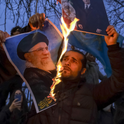In the midst of this miserable time for the once-dominant socialist and social democratic parties in Europe there is one shining exception: the West Balkans.
Without anyone paying much attention, Albania and Macedonia have got themselves social democratic governments this summer. Having narrowly won office in 2013, Edi Rama, the Albanian social democratic prime minister, scored a clear victory and four more years running his country in June.
Talking to me in his basketball shorts and black t-shirt at the prime minister’s summer residence on the beach at Durres, Rama exudes confidence about remaking Albania. He is a 1990s graduate of Europe’s most prestigious art school, Paris’s Ecole des Beaux Arts and his already made friends with Emmanuel Macron.
“Albania has always been a nation. Now we have to become a functioning state,” he says.
Rama has stopped subsidising the state electricity company and made users pay their bills, instead of promising free electricity like the old conservative government. 400 municipalities have been reduced to 61, with reform in each aided by an EU project to support local governance.
The police service, too, has been reformed. Rama inherited a force open to corruption; now, old police chiefs have been retired, and a new police academy is producing many more women officers. The murder rate in Albania has dropped radically, according to the World Bank which noted half the level of homicides under the Rama government than the former rightist administration. Teachers were invited to reform the curriculum and removed 600 text-books school children were previously expected to master. Half of Rama’s cabinet are women. Smoking in public is now illegal.
In a statement that would make Jeremy Corbyn choke on his home-grown veg, Rama blithely explains, “Our is a very New Labour programme. Modernise the state. Sound market economy. Increase pay for low-paid workers.”
Above all, Europe. When he became EU Commission president in 2014, Jean-Claude Juncker announced there would be no more enlargement until after 2019. As a result, those Western Balkan states like Albania that have made genuine progress in terms of economic reform—retiring dodgy judges, and de-corrupting the state—are well ahead of East European states who joined in 2004 and 2007, and have been left in limbo. EU Baltic states have twice as many murders per capita as Albania.
*** The dominant nation in the region is Serbia, which is now much closer to Moscow than Brussels. Putin provides free warplanes and other military equipment, and the influence of Russian fake news on Serb media is noted by all observers. As a report for the Committee to Protect Journalists put it last October, “uninformed tourists visiting Serbia could easily have believed that the country is a Russian outpost.
With large photos of Vladimir Putin on their covers, Serbian tabloids—by far the biggest source of print information in the country—were engaged in a discussion over whether the Russian President would defend Serbia and its contested part of Kosovo, or trade it for recognition of Crimea.”
According to the Financial Times Balkans correspondent, Andrew Byrne, the Kremlin controlled news agency, Sputnik, now dominates Serbia news outlets. “Serbia’s top politicians are beating a path to the pro-Russian news agency’s door, which — thanks to generous funding from the Kremlin — has become a major force in a polarised media landscape.
Faced with this influence, Rama stresses the need for equal support from Europe. “I desperately need the EU perspective to keep Albania focused on reform and modernisation,” argues Rama, who says he would be prepared to accept a lesser status than full voting rights.
Early in August, US Vice President Mike Pence hosted meeting of West Balkan leaders in Montenegro.
Other than in Serbia, the region remains grateful to America for putting an end to decade of Milosevic initiated wars in the 1990s. American soldiers are still quietly present as a warning to any Serb revanchist ambitions but other than political support and aid, the US cannot help the region grow its economy and find work for the young unemployed.
Only Europe can do that—but the EU has Balkans fatigue oozing from its pores. The West Balkans has been the playground for European centre-right parties grouped in the European People’s Party. But with the clear second term victory for Rama there is a case for Europe’s social democrats, including the Labour Party, to engage in greater depth with Rama in Albania.
*** Meanwhile, across the mountains that separate Albania from Macedonia, another new social democratic government is settling in. Like Rama, Zoran Zaev, 40, has extensive political experience—for twelve years, he was mayor of Macedonia’s second-biggest city. His party vice-president and now defence minister, Radmilla Sekerinska, has an American university degree, and could easily have disappeared to the US or Brussels during the long years of an increasingly erratic right-wing populist, nationalist prime minister, Nikola Gruevski, who was in power from 2006 to elections in December last year.
Greuvski filled Skopje with giant statues of Alexander the Great, trying to claim the Hellenic hero as the father figure for the Slav-Albanian nation. Like Viktor Orban in Hungary and Jarosaw Kaczynski in Poland, Gruevski turned to identitarian nationalism to channel support for his rule. Of course, it is absurdly ahistorical to claim that Alexander the Great has anything to do today’s Macedonian slavs whose language is close to Bulgarian. Indeed, the Greek province of Macedonia is a third bigger than the Macedonian republic.
Yet, armed with this image, Gruevski created what might be called an “Autogarchy”—a mixture of autocrats and oligarchs—as Macedonia suffered from state capture by the right, who ensured their cronies got the best contracts. Desperate to stay in power, Gruevski initiated a massive wire-tapping operation on his opponents after he narrowly won elections in 2014, listening in to as many as 20,000 political opponents as massive protests continued. Skopje was filled with angry demonstrations in 2015. Finally, even Gruevski’s which supporters in European conservative circles in Berlin and Brussels could no longer excuse his behaviour, and in 2016 he was forced to stand down. He now faces criminal investigation and trial.
*** Talking to Defence minister Sekerinska in the barrack-like Ministry of Defence in Spopke, she sounds just like a moderate northern European social democrat. She explained that the minimum wage will go up by 20 per cent, and the energy and transport sectors open up to foreign investment, to stop the corruption that follows when a state hands out monopoly contracts to cronies. Her party has an Albanian vice-president, Muhamed Zekiri, and Albanian MPs. Her key goal is entry into Nato, and she says Skopje is prepared to compromise with Greece.
Athens has consistently refused to recognize Macedonia under its name; Greece also refuses to recognize Kosovo. It was hoped that the arrival of a left government in the form of Syriza might allow Athens to drop in ultra-nationalist rejectionism of its two northern neighbours. But, rather like Theresa May depending on the ultra-Protestant DUP, the Greek Prime Minister, Alexis Tsipras, is in coalition with 10 MPs from a populist right-wing nationalist party, ANEL, whose leader is Greece’s Defence Minister.
In addition, Syriza’s foreign minister has been a life-long supporter of Russia, which backed Gruevski, and is seeking to use Serbia to win wider influence in the West Balkans.
When Greece says Macedonia cannot join Nato, let alone the EU, under its name, this is music to the Kremlin’s ears.
*** To the rest of the world, this may be a Lilliputian dispute—but somehow, no-one in Athens nor Skopje has been able to find a solution. The end of the ultra-nationalist Gruevski regime may help, if the Syriza government can also give ground on Greece’s equally nationalist line on what Macedonia should be called.
For Macedonia, too, getting closer to Brussels is a priority. As Britain’s Labour Party seems more and more willing to embrace a full rupture with Europe, its sister parties at the other end of Europe see the EU as the answer—not something to be as distant from as possible.
The West Balkans gave birth to the first world war and was the place where the last genocidal massacre in Europe took place in 1995 when 8,000 Bosnian Muslims were taken out by Serbs and killed and buried after being executed one by one. Even today, mass graves of Bosniaks killed by Serbs in the 1990s are being uncovered and the victims reburied with due ceremony.
The Chinese are building a highway from Belgrade to Budapest and Serbia makes little secret about being closer to Moscow than to Brussels. Has the enlargement fatigue that consumed the EU after Romania and Bulgaria in 2011 joined 7 east European ex-communist nations and Cyprus as EU members in 2004 now run its course? Albania and Macedonia, under social democrat governments, are now as well-placed as other new EU member states earlier this century.
After its lost decade following the crash, growth is back in the EU and unemployment is coming down. Getting the West Balkans to be more European and less, well, Balkan, would be challenge for Europe post-Brexit—but finally burying the region’s demons would show that the EU exists to some purpose.












